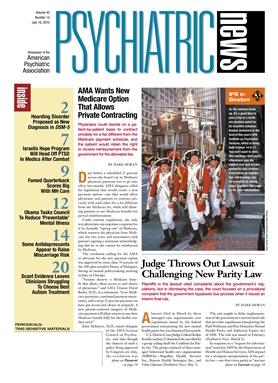What a thrill it has been to work with the planning committee to put together the program for APA's 62nd Institute on Psychiatric Services (IPS), to be held October 14 to 17 at the Boston Marriott Copley Place Hotel. This year's theme is “Leadership in Discovery and Service: 21st Century Psychiatry.”
Leadership has become a lost art for many in our profession. As services have disseminated into local community-based sites over the last 50 years and as allied professionals in social work and counseling have grown in terms of numbers and skills, psychiatry is becoming increasingly narrow in the range of services we provide.
Being a leader in psychiatry requires being a master clinician as well as being knowledgeable about the context in which we practice. This year's program is designed to convey knowledge and skills to support the leaders and future leaders in our field. Our goal is to make each attendee feel rejuvenated, recharged, and ready to reengage in the practice of psychiatry. Specifically, we aimed to provide sessions that promote insight into individual best-practice skills and increased understanding of the opportunities associated with the context and future of our profession.
There are a number of sessions that will focus on clinical excellence and clinical leadership. These include Ken Minkoff, M.D., and Chris Cline, L.C.S.W., on the ABCs of recovery in co-occurring treatment; Jeffrey Lieberman, M.D., on schizophrenia treatments; and Lisa Dixon, M.D., on a “survival guide” for mental health services researchers. We have drawn from local Boston talent to create a Boston all-stars immersion course on pharmacotherapy that will feature Donald Goff, M.D., Gary Sachs, M.D., and Janet Wozniak, M.D. Robert Goisman, M.D., will lead a master class on cognitive-behavioral therapy. The popular course that includes buprenorphine certification will also be offered.
A number of sessions are aimed at leaders in administration and services design. Barry Herman, M.D., will lead the popular course on administrative psychiatry, and Wes Sowers, M.D., has organized a symposium on leadership in public health services.
Other sessions have been planned on the implications of health care reform for psychiatry to equip attendees to take an active role in leading its implementation. A prominent leader in President Obama's administration, Richard Frank, will talk about the president's priorities in health care reform.
There will be numerous sessions on cultural psychiatry provided by APA's ONMA on Tour lecturers, and by Russell Lim, M.D., Rajvee Vora, M.D., and Lewis Mehl-Madrona, M.D. (OMNA stands for the Office of Minority and National Affairs.)
The keynote speaker at the opening session will be Kay Redfield Jamison, Ph.D., the Dalio Family Professor in Mood Disorders and co-director of the Mood Disorders Center at Johns Hopkins University. Jamison, author of the best-sellers An Unquiet Mind and Manic Depressive Illness: Bipolar Disorders and Recurrent Depression, is one of this country's most respected researchers on manic-depressive illness.
The federal Substance Abuse and Mental Health Services Administration (SAMHSA) will sponsor leading researchers to discuss the latest and greatest evidence-based services tool kits. The SAMHSA tool kits have been the leading influence on the state and community mental health implementation of evidence-based services. Attendees at these sessions will learn the newest information from some of the most prominent services researchers in the United States.
But it won't be all work and no play while you are in Boston. The city is at its most beautiful in the fall as the leaves burst into a spectrum of reds and golds. A good way to enjoy the foliage is to take a walk along the city's Freedom Trail or through the indoor courtyard of the Isabella Stewart Gardner Museum. And there is a special treat this time of year, as the crowds thin out and the weather is still pleasant.
Last year's institute was the most successful ever—it drew the largest attendance and won rave reviews. So plan now to attend this year's institute. More information on the meeting and its host city will appear in future issues of
Psychiatric News. Meanwhile, go to <
www.psych.org/ips> to register and reserve a hotel room. I look forward to seeing you in Boston.


